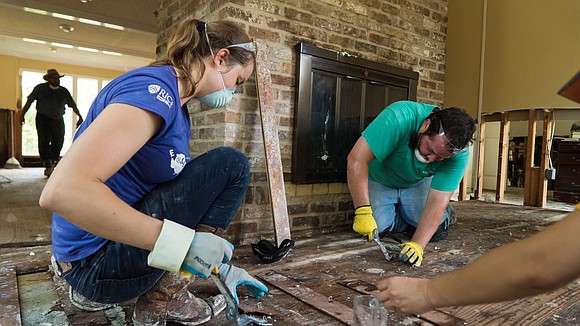Amid natural disaster, what can leaders do to help?
New paper examines examples of good leadership before, during and after Hurricane Harvey
Style Magazine Newswire | 11/29/2018, 11:43 a.m.
HOUSTON – (Nov. 29, 2018) – When faced with natural or unnatural disaster, leaders can take action by building teamwork skills, fostering open communication, supporting affected team members, and leading by example, according to a new article from psychologists at Rice University.
"Steering Through the Storm," published in a recent issue of People + Strategy, examines how leaders can respond with strength and support during times of crisis. The piece illustrates the recommendations with examples of leadership during Hurricane Harvey, which hit the Gulf Coast of Texas in 2017.
Authors Julie Dinh, a graduate student in psychological sciences at Rice, and Eduardo Salas, chair and professor of psychological sciences, drew on research from military, leadership, disaster and crew resource management areas, including work by Thomas Kolditz, a retired brigadier general and founding director of the Ann and John Doerr Institute for New Leaders at Rice.
Prior to a crisis, the researchers said, it is essential to build teamwork skills, develop a strong organizational identity, invest in preventative measures, understand the comprehensive impact of disaster (including effects beyond the work environment), and continually update emergency plans with robust channels of communication.
Dinh and Salas said this behavior was well-illustrated by the Texas Medical Center (TMC) prior to Hurricane Harvey. The organizations within the TMC built what the authors called "uniquely resilient and value-based cultures."
"Houston Methodist had crafted a mission statement based on integrity, compassion, accountability, respect and excellence,” the authors wrote. “Their commitment to this vision was proven when, during Harvey, leadership responded to unanticipated needs of its staff and providers, including the provision of critical resources and assistance."
During a crisis, leaders should engage actively with their constituents whenever possible, Dinh and Salas said. They noted that it's also critical that they "make sense" of disaster by distinguishing critical issues from less pressing needs, communicating risks, and maintaining readiness. Throughout the crisis, leaders should remain accessible and open to new sources of information, and take care of their own needs when necessary and appropriate.
The authors cited Lance Loken, CEO of real estate agency The Loken Group, as being an example of this "boots on the ground" engagement. "During Hurricane Harvey, he drove his pickup through the flooded waters to rescue stranded employees and their families," the authors wrote.
Another example of active engagement was the C-suite at Occidental Petroleum Corp., the authors said. When Harvey's waters flooded their headquarters, executives used a company app and spreadsheet to track employees and contacted them to ensure their safety.
Following a crisis, the article said, leaders should provide resources to help employees recover, including active assistance (such as providing emergency supplies, altering organizational policies, and offering extended leave for affected workers). They should also develop corporate social responsibility initiatives to help rebuild the community, and convey the narrative of the crisis sensitively.
A good example of this was local businessman Jim "Mattress Mack" McIngvale, owner of Gallery Furniture in Houston, the article said. Shortly after Harvey hit, he demonstrated what the authors called "transformational strength." Within hours, he opened the doors of his Houston-area furniture stores and converted the showrooms into makeshift shelters, housing people displaced by floodwaters. "His altruism and commitment generated goodwill among employees, established his company as a cornerstone of the community and cemented his place as one of Houston's beloved leaders," Dinh and Salas reported.
The authors also recalled the corporations across the Gulf Coast that provided emergency supplies, housing and loans for repairs and even hired helicopters to deliver water to stranded employees. Just as important as these active efforts were more structural accommodations, the authors wrote. "Administrators modified existing organizational procedures to allow for proper recovery, including allowing leaves of absence for those affected by crisis," Dinh and Salas wrote. "These multiple-pronged efforts underscored leadership's advocacy for well-being, creating atmospheres of greater resilience."
Dinh and Salas said experience may be the greatest teacher of how to deal with crisis. "Individuals are more capable if they've weathered storms previously," the authors said. "This is especially true for leaders in dangerous situations; followers are more likely to trust and respect superiors if they have already experienced trials by fire."
Dinh and Salas hope the research will provide important lessons for individuals preparing for, navigating or recovering from a crisis situation. The article is available online at https://bit.ly/2Ti8GTo.




